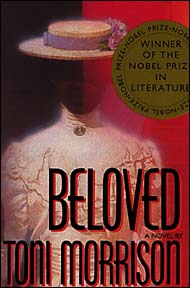

"There is no place you or I can go, to think about or not think about, to summon the presences of, or recollect the absences of slaves; nothing that reminds us of the ones who made the journey and of those who did not make it. There is no suitable memorial or plaque or wreath or wall or park or skyscraper lobby. There's no 300 foot tower. There's no small bench by the road. There is not even a tree scored, an initial that I can visit or you can visit in Charleston or Savannah or New York or Providence or, better still, on the banks of the Mississippi. And because such a place does not exist (that I know of), the book had to."
Toni Morrison, "A Bench by the Road" (Talking about Beloved)
I thought you might find this interesting, Greg, in terms of elegy and the unnameable event. Though I'm not doing a full re-reading of Beloved (wish I could), I'm just looking at some criticism and things.
I also read Philip Roth's The Ghostwriter over the weekend (I picked this one purposefully because I wanted to read Roth doing the kind of meta-fictional rewriting of myth/history that writers like Morrison and Silko and Coover are doing in the 'pomo' 70s and 80s. ) And because it's really really short. And, interestingly enough, the first of the Zuckerman novels. For Zuckerman to begin as rewriting the Anne Frank seems really interesting to me. Roth wrote Ghost Writer after the Jewish community was castigating him for his non-Utopian depictions of the Jewish community. And so young 23 year old Zuckerman uses Frank's position as Jewish Martyr who has to be dead to be affective as a touchpoint for his own relation to the Jewish community. Anyway, if Morrison's point is that there's no suitable memorial for slavery exists and so she must create it through the stretchy fabric of space/time the novel allows her, than Roth is saying there are too many memorials to the Holocaust that allow polite and pretty relation to a terrible past event that serve as rhetorical tools and pleasurable burdens to those alive today. If Morrison wants to write to create a historical closeness to events and people she can't know, Roth writes to create a critical distance that allows for parody and a self-imagining from which to rescue the present self from the enclosing fictions of the past.
Ghost Writer is also strange because it feels a lot like the Human Stain. It basically starts the same way. Zuckerman trekking to the house of a man he admires/homoerotically loves in some ways/wants to be. Zuckerman spends the first part of both novels spending time in the homes of these male objects of desire, soaking up their aura and listening/creating his stories with/for them. If Human Stain is partially an ode to the Invisible Man, Ghost Writer is an ode to Anne Frank. And in both Roth is aware of the void of any real person/historical event as blank spaces on to which not just writers, but everyday people, use to project their own fictions upon. Real life is always more interesting than fiction, Roth says in this novel, but 'real life' is never real and the person you think you know is never disentangled from your own image of yourself. We're always Ghost-Writing all the time constantly is what both Roth and Morrison seem to be saying in radically different ways.
